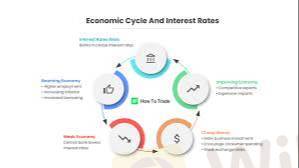
2025-02-06 20:27
الصناعةForex and economic circle
#firstdealofthenewyearastylz
Forex Market
The Forex market is a global decentralized market where individuals, businesses, and institutions trade currencies. It's the largest and most liquid financial market in the world.
Economic Circle
The economic circle, also known as the circular flow of income, refers to the continuous movement of money, goods, and services within an economy. It involves the interactions between households, businesses, government, and the foreign sector.
*Key Components of the Economic Circle*
1. *Households*: Consume goods and services, provide labor, and receive income.
2. *Businesses*: Produce goods and services, employ labor, and generate revenue.
3. *Government*: Collects taxes, provides public goods and services, and regulates economic activity.
4. *Foreign Sector*: Engages in international trade, invests in foreign assets, and receives foreign investment.
Relationship Between Forex and Economic Circle
1. *Exchange Rates*: Changes in exchange rates affect the competitiveness of domestic businesses, influencing the economic circle.
2. *Trade Balance*: The trade balance (exports minus imports) affects the demand for and supply of currencies, influencing exchange rates and the Forex market.
3. *Investment and Capital Flows*: Foreign investment and capital flows can impact exchange rates, interest rates, and economic activity within the economic circle.
4. *Monetary Policy*: Central banks' monetary policy decisions, such as interest rate changes, can influence exchange rates, economic activity, and the Forex market.
Impact of Forex on Economic Circle
1. *Economic Growth*: Changes in exchange rates and trade balances can impact economic growth, employment, and income.
2. *Inflation*: Exchange rate fluctuations can influence import prices, affecting inflation and monetary policy decisions.
3. *Employment*: Changes in exchange rates and trade balances can impact employment opportunities, particularly in industries that rely heavily on exports or imports.
Impact of Economic Circle on Forex
1. *Exchange Rate Determination*: Economic indicators, such as GDP growth, inflation, and interest rates, influence exchange rate determination.
2. *Currency Volatility*: Economic uncertainty, trade tensions, and monetary policy decisions can contribute to currency volatility.
3. *Investment Decisions*: Economic conditions, interest rates, and exchange rates influence investment decisions, affecting capital flows and the Forex market.
In conclusion, the Forex market and economic circle are closely interconnected. Changes in exchange rates, trade balances, and economic indicators can impact the economic circle, while economic conditions, monetary policy decisions, and investment flows can influence the Forex market.
إعجاب 0

Aishatu6323
وسطاء
مناقشة حية
الصناعة
NFP updates URDU
الصناعة
دوج كوين
الصناعة
دوجكوين
الصناعة
صعود الذهب
الصناعة
لقاحات كورونا
الصناعة
السيارات
فئة المنتدى

منصة

المعرض

الوكيل

التوظيف

استيراتيجية التداول التلقائي

الصناعة

السوق

المؤشر
Forex and economic circle
 Hong Kong | 2025-02-06 20:27
Hong Kong | 2025-02-06 20:27#firstdealofthenewyearastylz
Forex Market
The Forex market is a global decentralized market where individuals, businesses, and institutions trade currencies. It's the largest and most liquid financial market in the world.
Economic Circle
The economic circle, also known as the circular flow of income, refers to the continuous movement of money, goods, and services within an economy. It involves the interactions between households, businesses, government, and the foreign sector.
*Key Components of the Economic Circle*
1. *Households*: Consume goods and services, provide labor, and receive income.
2. *Businesses*: Produce goods and services, employ labor, and generate revenue.
3. *Government*: Collects taxes, provides public goods and services, and regulates economic activity.
4. *Foreign Sector*: Engages in international trade, invests in foreign assets, and receives foreign investment.
Relationship Between Forex and Economic Circle
1. *Exchange Rates*: Changes in exchange rates affect the competitiveness of domestic businesses, influencing the economic circle.
2. *Trade Balance*: The trade balance (exports minus imports) affects the demand for and supply of currencies, influencing exchange rates and the Forex market.
3. *Investment and Capital Flows*: Foreign investment and capital flows can impact exchange rates, interest rates, and economic activity within the economic circle.
4. *Monetary Policy*: Central banks' monetary policy decisions, such as interest rate changes, can influence exchange rates, economic activity, and the Forex market.
Impact of Forex on Economic Circle
1. *Economic Growth*: Changes in exchange rates and trade balances can impact economic growth, employment, and income.
2. *Inflation*: Exchange rate fluctuations can influence import prices, affecting inflation and monetary policy decisions.
3. *Employment*: Changes in exchange rates and trade balances can impact employment opportunities, particularly in industries that rely heavily on exports or imports.
Impact of Economic Circle on Forex
1. *Exchange Rate Determination*: Economic indicators, such as GDP growth, inflation, and interest rates, influence exchange rate determination.
2. *Currency Volatility*: Economic uncertainty, trade tensions, and monetary policy decisions can contribute to currency volatility.
3. *Investment Decisions*: Economic conditions, interest rates, and exchange rates influence investment decisions, affecting capital flows and the Forex market.
In conclusion, the Forex market and economic circle are closely interconnected. Changes in exchange rates, trade balances, and economic indicators can impact the economic circle, while economic conditions, monetary policy decisions, and investment flows can influence the Forex market.
إعجاب 0
أريد أن اترك تعليق
تقديم
0تعليقات

لا توجد تعليقات حتى الآن ، كن أول شخص يعلق

تقديم
لا توجد تعليقات حتى الآن ، كن أول شخص يعلق